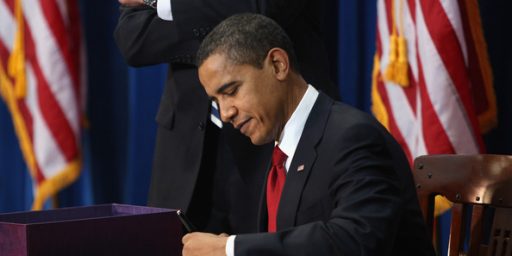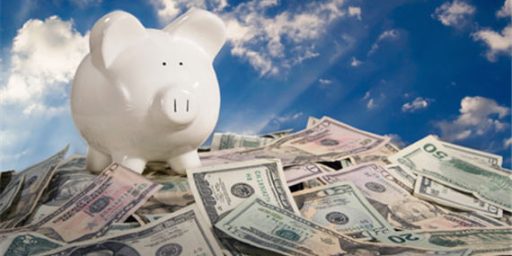Why Fiscal Policy Tends Not to Work
Almost 2 weeks ago commenter Odograph posted this link. It talks about how much bang one gets for one’s stimulus spending.
This chart shows the bang for the buck that the government can expect to get from various stimulus proposals. For each dollar spent on food stamps, for example, real gross domestic product is likely to rise by $1.73. For each dollar spent on aid to state governments, G.D.P. is likely to rise by $1.36. (This is what economists refer to the as the multiplier effect.)
There is just one problem with this. The multiplier affect that first year economics students learn about has one important caveat: that the increase in spending be exogenous. That is the money is not already coming out from another part of the economy. Think of it this way:
- Take money from Paul.
- Give it to Peter.
- Peter spends it.
- Economic nirvana.
The fourth point hinges on a hidden assumption: Paul was not going to spend the money. For example, the article linked above states the following,
Why might this be true?
Well, people don’t necessarily spend 100 percent of the money they get back in the form of tax rebates. If they’re not in dire straits — which most of the people receiving stimulus checks last time around weren’t — they might save much of it or use it to pay down debt. Neither of these actions boosts the economy much in the short term.
If I pay down debts with my tax rebate I have spent 100% of the money, thus negating the opening premise. If I save the money then the money can be loaned back out to another who will then spend it.
Now in the current situation one could say that saving the money may not result it being lended back out. Fair enough, but where is this money going to come from anyways if we go with stimulus spending? Tax increases? Maybe. An inflation tax? Maybe. Borrowing? Maybe. All of the above? Maybe. But all of these activities take money that is currently in the economy and simply moves it around. It isn’t clear that borrowing $150 billion is going to end up having a bigger impact on the economy than leaving that $150 billion for other people to borrow and spend. People borrow money to spend it, not just sit on it. If people don’t spend it they are losing money. The only reason for having the government borrow it is if nobody else is going to borrow it.
Basically when a student learns about the multiplier effect the government has a mysterious bag of money, where it came from nobody knows. That money is then tossed out of a helicopter and then spent by people.
As Raj Chetty, an economist at the University of California at Berkeley, points out, many recently unemployed don’t have much cash on hand when they lose their jobs, but they are loath to fall behind on pre-existing commitments like mortgage or other debt payments. Doing so would damage their credit rating. Many of them instead cut down on their consumption of things like food and other basic necessities. Extending their jobless benefits or giving them food stamps allows them to keep spending on these items — spending that translates directly into short-term economic growth.
This maybe true to an extent but there is nothing to say that people will not compensate by reducing spending in other catagories such as utilities, household maintenance, etc. When one loses one’s source(s)of income, reducing expenditures and conserving cash is a reasonable response. Also, food is not exactly what you’d call a huge portion of personal consumption expenditures (PCE). In both 2006 and 2007 expenditures of food were about 13.7% of PCE. PCE is about 70% of GDP so food expenditures are about 9.5% of GDP and we are talking about subsidizing only a fraction of that via food stamps. The bang might be biggest in terms of bang per dollar, but it still if there is going to be a bang it will be a pretty small bang. And again, this money has to come from somewhere else in the economy. That means that somewhere else in the economy there is likely going to be a decrease in output.
The same applies to tax rebates and tax cuts as well. The only thing about a tax cut is that a tax cut also reduces the deadweight loss associated with taxes. However, this reduction in loss of efficiency is not enough to result in a large increase in economic activity. Further a one time tax rebate may not work because of the permanent income hypothesis. This hypothesis holds that if a person gets a one time increase in their income they will save the money and enjoy a permanent increase in interest income.
Basically, the idea behind the multiplier effect that underlies most of fiscal policy is that it only works if the money was not going to be spent in the first place. If Paul, using the example above, was going to spend the money anyways, then taking it and giving it to Peter really doesn’t help at all. In fact, if Paul reduces his future work effort because he knows his income will be taken then it could very well end up that the multiplier is less than 1 meaning a decrease in economic output. Similarly if we borrow the money, again Paul doesn’t have it to spend and so the increase in output is likely to be the same prior to borrowing. It only works if Paul wasn’t going to spend the money or lend it out.
Update: Over at Marginal Revolution Alex Tabarrok has a good line from one of his colleagues, Russ Roberts,
My colleague Russ Roberts says fiscal policy is like trying to raise the water level by dipping a bucket in the deep end of a pool and dumping it in the shallow end.
Pretty much sums it for me.






Note that that means it wasn’t going to be kept in the bank, either—money in the bank gets loaned to other people.
I think the assumption was a lot better, say, 100 years ago or even 80 years ago when Lord Keynes was first expounding his ideas than it does now. Few people have completely idle money these days.
Don’t tax cuts add another dimension by improving consumer and business confidence that leads to more durable goods spending and expansion? This grows the pie rather than merely shift things around. The evidence of usually increasing tax revenues when tax rates are cut supports this.
Thanks for the mention. Do you work things like “that first year economics students learn” into your everyday conversations as well? 😉
I think there are two questions here:
1) is a stimulus necessary?
2) what kind of stimulus?
The folks that wrote that paper were discussing #2, and I don’t think they missed that the money had to come from somewhere.
Who were they anyway? The Economic Policy Institute? Who are they, a bunch of first year economics students?
No, they are Keynesian/New Keynesian economists who hold, unsurprisingly, to the Keynesian view that there is a multiplier that is significantly greater than 1.
The EPI is/was staffed by people who complained that Bush’s fiscal stimulus, the tax cuts, was actually going to do nothing except return us to trend (at best) in terms of unemployment/employment. Now to be fair they thought the money should be “targeted” like the authors of the story to get the most bang for the buck.
Problem is those “big bang” areas are small, and injecting even $200 billion into the economy, if we had it lying around, would be pretty small compared to a $14 trillion dollar economy.
Maybe if they took the trillions they are using to bail out Wall Street and gave it to consumers…..
Funny how that never crops up from these types.
I call this the Divisor Effect, and I’ve still yet to meet a Keynesian who had an answer for it.
Here’s a radical thought, what if, instead of bailouts, they just cut tax rates instead?
Historically the impact here hasn’t been that great either. For pretty much the same reason. The government doesn’t reduce spending, so whatever extra money a consumer finds in his pocket ends up getting borrowed by government to provide the same services as before. Hard to get much extra bang there.
Maybe permanent tax cuts along with a permanent reduction in spending. Of course, the impact wouldn’t be felt most likely until the current economic problems are long past. Fiscal policy in any shape happens to be an imprecise tool at best and if any good does come it is usually be happenstance not pre-planning.
Cut tax rates on what? Profit? Payroll? Land? Where can you cut taxes that will stabilize Citigroup?
Just did some back of the envelope type of calculations.
Using Odograph’s link and the numbers provided therein lets suppose President Obama decides on a $200 billion food stamp stimulus package since that will provide the bigggest bang for the buck.
Now using the multiplier in that article we’ll get an extra $146 billion in economic output or about 1% extra GDP more or less.
Now if GDP declines, in other areas, by more than that then we wont see any growth. If the economy declines by just 1% then it will just offset the losses.
Mind you this has to all be in food stamps. Any other program will not give us nearly the same jump. Of course our current food stamp program is somewhere in the neighborhood of $33 billion. I’m not sure that a $200 billion increase is going to net us the same multiplier, but what the heck.
There you have it, Obama’s stimulus package to improve economic growth by 1%. Of course, if we took $1 trillion of the $7.76 trillion that we’ve put towards bailing out wall street into food stamps why we’d have 5% growth for every year we did it. That is amazing growth! Why we could go this route and let Wall Street burn to the ground.
One of the problems today is that companies are borrowing money just to sit on it. Many companies are fully drawing their credit lines in fear that the banks will withdraw the unused portion of the lines. The companies don’t need it for anything other than future liquidity and the only way to assure that liquidity is to draw the line now.
Actually, to some extent that is kind of good for the banks. They now have a source of interest income. Better than having the money sitting there not being borrowed.
Also, the largest poriton of GDP is personal consumption expenditures, as such even if a number of firms are doing this it wont be a large factor. Now if consumers were doing it….
I said nothing about wanting to bail out Citigroup. In fact, given their current value, the Government should just outright buy all the Citigroup shares, put it in receivership and gracefully liquidate the assets so as not to cause any panics or other problems or bring it back to health and then sell it again. My preference is for the former, rather than the latter. There’ll be significant corruption and graft either way, but at least it will end in one case rather than go on forever.
Lots of good money chasing bad here. The fact that it is tax dollars, or more accurately further debt, doens’t make it any better. Viewed correctly, it just provides a convenient method to grossly underestimate the true cost of the bailouts. Any “cost” that doesn’t include interest on this massive debt until it is retired is delusional.
An Obama administration could still do the buy-out right? (or to call it by its name “seizure”, if it is non-voluntary)
Fair enough, and pretty much in line with what I was suggesting at the start of the bailout talks.
But if not Citigroup, who would tax cuts save? And again, which taxes should we cut, and how will that help them?
Say, Perfesser, if a money supply is just a body of water then why bother moving money around all the time?
Well, to keep it circulating, obviously.
But why bother to circulate it if it’s all perfectly fungible?
That’s because what people do with their water is significant. Where it goes reflects peoples’ ideas about value and utility, and that lets other people know what the most productive activities are.
Oh. Wait. So it does make a difference when somebody transports water to one end of the pool rather than the other?
No, of course not. What difference could it make if you just transported water from one end of the pool rather than another?
Sorry. Couldn’t resist.
Is this a trick question? Um…, taxpayers?
This was a really interesting simplification of the whole thing. It makes me realize that the tax cuts proposed by the leftist illuminati make even less sense than I thought they did.
Okay then, which taxes? Income? FICA? Capital gains? Sales? How will that help the people who need the help?